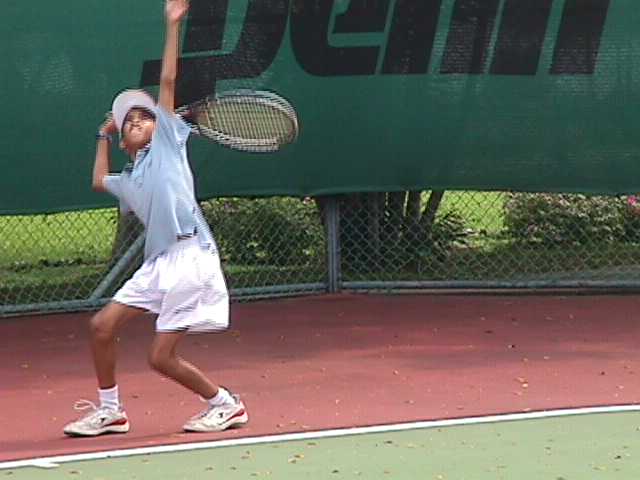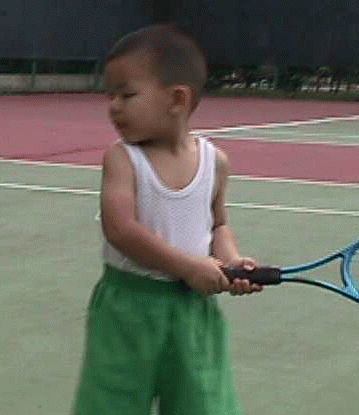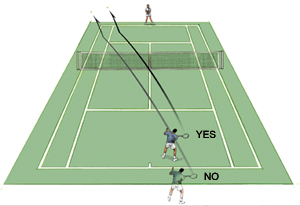
First and foremost, tennis is a game of control. It also requires many physical elements, such as good flexibility, co-ordination, aerobic fitness, strength and a good mental ability. Mastery of the mind is the crucial factor that tips the balance in favor of the winner. Read sports psychology and mental toughness articles to gain insight and boost your performance.
Better performances can be the product of a number of factors. This product is primarily the outcome of efficient technique, the progression of speed and the maturing competitive attitude on a sound basis of general endurance, all round strength and general mobility."More tennis can be learned off the court, in the study of theory, and in watching the best players in action, than can ever be learned in actual play." -- Bill Tilden
Motivation. Without it, the player will not push into these uncomfortable feelings/states and therefore will either not improve or improve at a very low rate. That's why only players with very strong internal motivation become top players, since they were able to endure hours and hours of grueling tennis training, which in the end made them fast, fit, mentally tough masters of tennis technique and strategy.
There's only one corner of the universe you can be certain of improving, and that's your own self. ~~ Aldous Huxley
One of the best ways to encourage young players to be hopeful about themselves is to introduce them to other players who can act as "Buddies"; with similar patterns of strengths and weaknesses. Often these individuals have discovered alternative ways of thinking and learning and can provide practical help and encouragement that continued effort is worthwhile. They demonstrate how hard work and effective strategies can lead to success.
Ultimately, the athlete determines this development himself. Desire is the basis of motivation. Knowing how to desire is a mystery that is rarely solved, but in the end it is always up to the individual athlete.
You cannot push anyone up a ladder unless he be willing to climb himself. -Andrew Carnegie
Anticipation & co-ordination skills ~- Eye ~- Body ~- Brain, is the way we want our co-ordination and anticipation skills. Unfortunately many of us see the ball, and our body takes too long to react to it, passing us. This area can be improved by developing what is called your tracking technique, so that you see the ball, and your body automatically positions itself in the correct place. With a complete variety of situations you can be in for a ball to pass you, you need to work on improving your total body, to react as one fast efficient machine.
You must be fast, have an explosive first step, commit to chasing every ball, ensure the ball is struck consistently and make good tactical decisions. You will acquire the experience and be able to focus on, not just watching where the ball is coming from, but watch the ball and the opponent and read what they are doing.
"Speed in tennis is a strange mixture of intuition, guesswork, footwork and hair-trigger reflexes. Many of the players famed for quickness on court would finish dead last in a field of schoolgirls in a race over any distance more than ten yards". ~ Eugene Scott
Tennis is not just a game of physical ability, techniques, and tactics. The most perfect racquet technique in the world will not suffice if the directing mind is wandering. There are many causes of a wandering mind in a tennis match. Complete concentration on the matter in hand is the only cure for a wandering mind, and the sooner the lesson is learned the more rapid the improvement of the player.
You don't have to hit the ball hard to have a big game. Consistency is a weapon just like a big forehand or serve. The difference is it begins with the proper mindset. Therefore, to play winning tennis, your knowledge must be broad and thorough.
After consistency, depth of shot must be added to your repertoire. By hitting higher over the net, you will minimize your net errors, and keep your opponent pinned in the backcourt. You will apply a lot of pressure to your opponent who will be faced with a high forehand or a high backhand. We all know how difficult these shots are.
Finally, in order to dictate or counter your opponent's attack, bring power to your play. Power, Power, Power!. Add power through smoothly accelerating the head of the racquet and transferring your weight at the right time. (biomechanical principles ) If you develop your game around power, it is always at the expense of control, consistency, and depth. Power without control is meaningless. When most players hit with power they inevitably go outside of their control range. You must learn what your control range is with a given amount of power. If you step outside this control range, life on the tennis court becomes tough, not to mention frustrating. However, if you will follow these steps, you will become a controlled, consistent, and deep hard hitting player. Wow! That's tough to beat.
Tactics, fitness, stroke ability, adaptability, experience, and sportsmanship are all necessary for winning.~ Fred Perry
Here are the fundamental strokes:
Grip - Your grip will depend on the type of shot you play
Forehand - learn the proper techniques to develop this stroke
Backhand - The 2handed backhand is really the easiest stroke to perfect
Volley
- What a great weapon to use for intense club competition
Lobs - is something that we should spend more time practicing
Overheads - your answer to the lobs
Drop Shots - Shots not only for the advanced players
Slice - What a way to break the pace of you opponents ground strokes
Serve - Your weapon?
Approach Shots - In approaching the net, the placement of your shots is crucial to the success of any attack. Allow your position and the height at which you play the ball to dictate the stroke, but shorten the backswing for extra control. (compact swing).
Return of Serve - The other weapon
Tennis
is a game of skill. It requires as much thinking and planning as stroke production.
And it can give you as much or more fun from outfoxing opponents as you can
get from whacking the devil out of the tennis ball.- William
Talbert

Strengthen
your body and I guarantee your
game will escalate.
How good you want to become depends on the amount of time spent on the tennis courts. There are no hard and fast rules for learning to play tennis or for developing your game, and there is no one style which could be laid down as the "correct" way to play. Your own style could be one of the most important decisions you willl make in tennis. You should take great care in deciding on which champion you should model your strokes and your natural approach to the game; you should give much thought to deciding whether to change any stroke which may feel natural; and you should be wary of any person who tells you there is only one way to make certain strokes or only one way to play certain shots. The first step of knowing what result you want is critical to maintaining control of the learning process where it belongs – with you..
Once you acquire the basics, you can start mixing shots together. Then you can start composing points. Mix up your shots. Add direction, height, spin and shot selection. Make it fun for someone to watch you play or even while you are practicing.
Practice sessions must be approached with a sense of purpose. That means asking yourself some very basic questions. How much of an investment, in terms of both time and money, can you afford to make in your tennis? If you want to get the most out of your court time, knowing how many hours you can allot to the game will allow you to plan appropriately. But there should always be an end to the means. Too often, players take the court and hit balls with no particular purpose in mind. Practice should be about improving specific strokes, tactics, movement, or conditioning. Picking up bad habits on the your fundamentals is the easiest way to give up on a great sport, on the other hand a good footwork wil help your game a great deal. And when you get better, you put yourself in a better position to win.
"An ounce of practice is worth more than tons of preaching.~~Mohandas Ghandi
Such comprehension permits you to play the proper shot, in the most effective manner, at the right moment, almost automatically or intuitively. - William Talbert
All
USPTA certified professionals have participated in an extensive
education and testing process which included:
1. Completion of the Professional Tennis Coaches Academy teaching assignment
2. A 100-question written exam covering business and instruction
3. A stroke analysis and tennis grips exam
4. A playing exam
5. An on-court exam that requires teaching a private and a group lesson.
6. Management
of the junior
development program
The Art of War ~~ "All can see the tactics whereby I conquer, but what none can see is the strategy out of which victory is evolved." — Sun Tzu